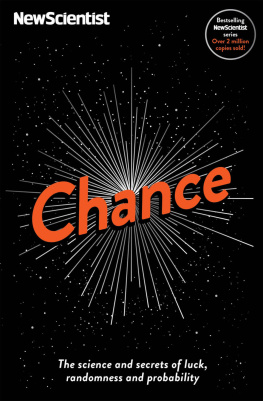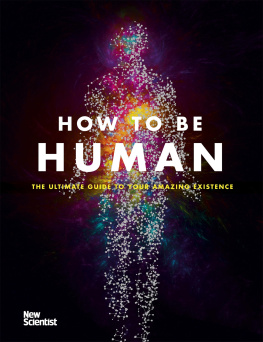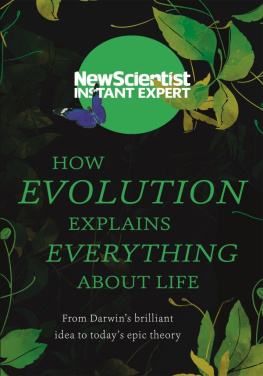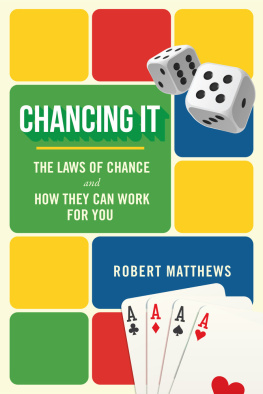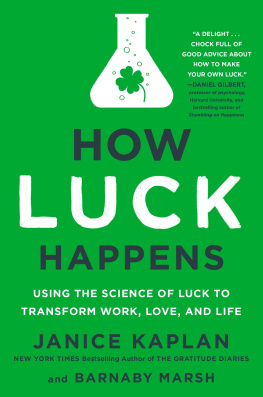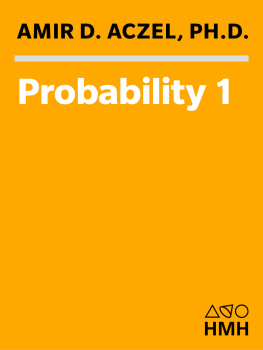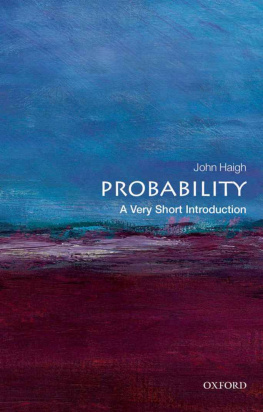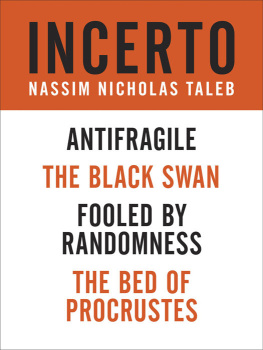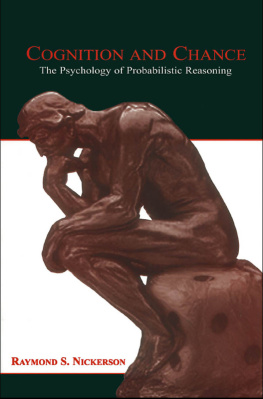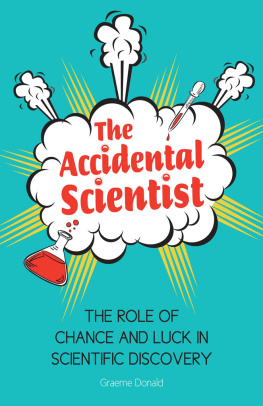Scientist - Chance: the science and secrets of luck, randomness and probability
Here you can read online Scientist - Chance: the science and secrets of luck, randomness and probability full text of the book (entire story) in english for free. Download pdf and epub, get meaning, cover and reviews about this ebook. City: London, year: 2016, publisher: Hodder & Stoughton; John Murray, genre: Romance novel. Description of the work, (preface) as well as reviews are available. Best literature library LitArk.com created for fans of good reading and offers a wide selection of genres:
Romance novel
Science fiction
Adventure
Detective
Science
History
Home and family
Prose
Art
Politics
Computer
Non-fiction
Religion
Business
Children
Humor
Choose a favorite category and find really read worthwhile books. Enjoy immersion in the world of imagination, feel the emotions of the characters or learn something new for yourself, make an fascinating discovery.
- Book:Chance: the science and secrets of luck, randomness and probability
- Author:
- Publisher:Hodder & Stoughton; John Murray
- Genre:
- Year:2016
- City:London
- Rating:3 / 5
- Favourites:Add to favourites
- Your mark:
- 60
- 1
- 2
- 3
- 4
- 5
Chance: the science and secrets of luck, randomness and probability: summary, description and annotation
We offer to read an annotation, description, summary or preface (depends on what the author of the book "Chance: the science and secrets of luck, randomness and probability" wrote himself). If you haven't found the necessary information about the book — write in the comments, we will try to find it.
Scientist: author's other books
Who wrote Chance: the science and secrets of luck, randomness and probability? Find out the surname, the name of the author of the book and a list of all author's works by series.
Chance: the science and secrets of luck, randomness and probability — read online for free the complete book (whole text) full work
Below is the text of the book, divided by pages. System saving the place of the last page read, allows you to conveniently read the book "Chance: the science and secrets of luck, randomness and probability" online for free, without having to search again every time where you left off. Put a bookmark, and you can go to the page where you finished reading at any time.
Font size:
Interval:
Bookmark:
Does Anything Eat Wasps?
Why Dont Penguins Feet Freeze?
How to Fossilise Your Hamster
Do Polar Bears Get Lonely?
How to Make a Tornado
Why Cant Elephants Jump?
Farmer Buckleys Exploding Trousers
Why Are Orangutans Orange?
Will We Ever Speak Dolphin?
Nothing
Question Everything
How Long is Now?

chance
The science and secrets of luck, randomness and probability
edited by Michael Brooks

www.johnmurray.co.uk
First published in Great Britain in 2015 by Profile Books Ltd.
Reissued in 2016 by John Murray (Publishers)
An Hachette UK company
Copyright New Scientist 2015
The moral right of the Authors of the Work has been asserted in accordance with the Copyright, Designs and Patents Act 1988.
All rights reserved.
No part of this publication may be reproduced, stored in a retrieval system, or transmitted, in any form or by any means without the prior written permission of the publisher, nor be otherwise circulated in any form of binding or cover other than that in which it is published and without a similar condition being imposed on the subsequent purchaser.
A CIP catalogue record for this title is available from the British Library
ISBN 978 1 473 64265 2
John Murray (Publishers)
Carmelite House
50 Victoria Embankment
London EC4Y 0DZ
www.johnmurray.co.uk
Contents
Introduction
In 1989, a teenager called Richard Hill travelled north to Manchester, England, where he stayed with a friend of a friend. The next day, Ann, the friends friends mother, happened to be heading to Oxford. She offered Richard a lift south. He accepted.
During the journey, Richard mentioned that he lived in a nearby town called Swindon. Ah, said Ann, maybe you know someone called Michael Brooks? He lives in Swindon. Hed be about twenty.
There was a pause. Hes engaged to my sister, Richard said.
Oh, said Ann. Hes my step-son.
I had not seen Anns husband my father since I was about a year old. But by chance, my future brother-in-law had stayed in my fathers house. By chance, my fathers wife had been heading in the same direction the next day. By chance the conversation had taken a turn that revealed a spooky connection between them.
Im sure you have one of these stories. They defy explanation, and we cant help but imbue them with a deep significance. Richard, Ann and I we are in regular contact thanks to that chance event still dont know what to make of that extraordinary coincidence. It resonates with us as a kind of fundamental pivot point in all our lives. But should it?
To answer that, you have to understand what chance actually is. And it turns out that this is much harder than you might expect.
What are the chances? It is a question that rings out every day, everywhere that humans exist. We dont usually have an answer at least not one thats correct. Take the calculation by author Ali Binazir, who claimed, via a chain of reasoning about your mother and father meeting, eggs getting fertilised, and human longevity, that the odds of you existing are 1 in 102,685,000 a 10 followed by 2,685,000 zeroes.
Such odds are, at first glance, impressive. They create a sense of awe. But they are also nonsense. You are the result of all those things actually happening, whatever the odds of two random people falling in love, or a particular sperm fertilising a particular egg. And so is everyone else on the planet. There is no pool of people that didnt get born, so there is no way to calculate a probability of you existing. I hate to say it, but youre not, as Binazir claims, a miracle. Youre just a link in the human chain.
Not that we can deny the role of chance in our universe. After all, it appears to be the most fundamental process in the laws of physics. Dig deep into the way everything works, and you find yourself dealing with quantum theory. This describes the world of the extremely small things from which all matter is made. Atoms, electrons, protons (and the quarks that are a protons constituent parts) all obey the laws of quantum physics. And these laws are, in many ways, lawless. There is no cause and effect at the heart of quantum theory: if I measure a property such as the spin of an electron it might be clockwise or anticlockwise. But the actual result of any single measurement is entirely unknowable in advance: it manifests at random. One of the most famous quotes in science is Einsteins reaction to this, a refusal to believe it can really be how the universe operates. God does not play dice, he said to the physicist Niels Bohr.
Bohrs response was brilliant: he scolded Einstein for telling God what to do. He was right: our natural intuition that all effects must have a cause is not to be trusted. It evolved over millennia thanks to a need to survive in hostile landscapes. Our ancestors were better off assuming the bush over there is moving because of a tiger waiting to pounce than blithely assuming there is no reason for the rustling leaves. Evasive action may not always be strictly necessary, but its the ultimate example of better safe than sorry.
For the same reasons, chance disarms us, causing us to attach significance to events that have no significance. Naively, we marvel at the discovery that two people at a party share the same birthday another what are the chances? But, if there are 23 or more people in the room, a shared birthday is statistically likely.
Its worth issuing a warning here: playing the birthday statistician is more likely to make you the party-pooper than the events life and soul. Thats because dealing properly with chance takes real mental effort, and parties arent always the best place to demand that. However, chance is not just about gritty thinking; it can be a gateway to great fun and even unexpected success.
Understand the way human brains process chance and you could become the next world champion at rock-paper-scissors. Get to grips with its mathematical laws and you can make money betting on a football match no matter who eventually wins the game. You might even be able to walk into a casino and beat the house for a while, at least. Delve into those myths about people being naturally lucky, or star-crossd and thus fated to suffer, and youll discover that you can make your own luck.
Shakespeares Romeo, the original star-crossd lover, claimed that he was fortunes fool, created to fall into the hands of fate. But scientists are not sitting down and waiting for fate to determine their worthiness for a Nobel Prize. Instead they are skewing the odds in their favour by analysing serendipity and putting themselves in the best possible position to stumble across new discoveries. Louis Pasteurs contention that chance favours only the prepared mind is one to take seriously, as it turns out.
Perhaps nowhere is the application of chance more serious than in the courtroom. If you have ever served on a jury, youll have had the uncomfortable experience of making a life-changing decision (with the small comfort that its always about someone elses life) based on much less information than youd like. Rare is the open-and-shut case; instead, the jurys verdict hangs on its members judgements of likelihood and probability. Here, again, our primitive brains often let us down. Even expert witnesses get chance wrong sometimes; no wonder moves are afoot to change the way we deal with chance in the legal sphere.
Font size:
Interval:
Bookmark:
Similar books «Chance: the science and secrets of luck, randomness and probability»
Look at similar books to Chance: the science and secrets of luck, randomness and probability. We have selected literature similar in name and meaning in the hope of providing readers with more options to find new, interesting, not yet read works.
Discussion, reviews of the book Chance: the science and secrets of luck, randomness and probability and just readers' own opinions. Leave your comments, write what you think about the work, its meaning or the main characters. Specify what exactly you liked and what you didn't like, and why you think so.

